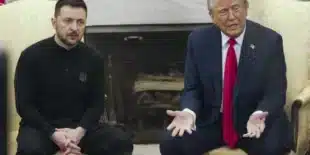Former leader of the Progressive Socialist Party, Walid Jumblat, along with the Democratic Gathering bloc, has officially endorsed Army Chief General Joseph Aoun for the upcoming presidential election, set for January 9. Jumblat’s announcement makes him one of the first political figures to publicly back a candidate.
Jumblat’s support for Aoun stems from his belief in the army’s crucial role in Lebanon’s stability. He praised Aoun for his leadership, emphasizing that the army is an essential institution for the security and stability of the country.
The Lebanese army holds a respected position in Lebanon, known for bridging divides in a politically fragmented society. Recently, the army has played a key role in the implementation of a ceasefire agreement between Israel and Lebanon, particularly in southern Lebanon, where the Lebanese army and U.N. peacekeepers are now the only armed entities allowed. Hezbollah, a powerful political and military group, has stated that it is cooperating with the army in this effort.
The situation is marked by a stark divide: Hezbollah and its ally Amal support a presidential candidate who would protect their influence and maintain Hezbollah’s right to defend Lebanon. In contrast, opposition forces advocate for a president who would disarm Hezbollah and ensure that only the Lebanese army is responsible for defending the country and maintaining order, particularly in southern Lebanon, which borders Israel.
Kataeb leader Sami Gemayel, speaking on behalf of the opposition, expressed support for a president committed to enforcing the ceasefire agreement and ensuring that only the Lebanese army possesses weapons. However, no opposition candidate has been agreed upon as of yet.
The ceasefire, which was brokered by the U.S. and France, calls for the withdrawal of Hezbollah and Israeli forces from southern Lebanon, with the Lebanese army taking full control in the area. This move aims to implement United Nations Security Council Resolution 1701, which was initially passed in 2006 to end hostilities between Hezbollah and Israel. Resolution 1701 stipulates that the Lebanese state, in partnership with the U.N., should be the exclusive armed presence in the region, a provision that has not been fully enforced until now.
Gemayel confirmed that the opposition is still in the process of consulting with each other, but reiterated that they will not announce their presidential candidate until these talks conclude.


